There’s an expression in England: it’s grim up north. There has long been a north-south divide – between the former industrial heartlands of the north and the softer, green and pleasant land in the south.
Up north, the great lost city of British metal is Bradford. The city is located in the foothills of the Pennine mountains in the western part of the county of Yorkshire. Bradford was the epicentre of the international wool trade in the late nineteenth century and a key driver of the industrial revolution. Now it is better known as the ‘curry capital’ of England, is home to a diverse, multi- ethnic population, and has a healthy film scene.
But back in the early nineties, something darker began to stir in the city and the surrounding towns: a new musical movement which blended goth, metal and hardcore punk. Back in 1980, goth pioneers The Sisters of Mercy had emerged twelve miles away in Leeds. New Model Army formed in the same year in Bradford. By the late eighties, the grandiose gloom of Sweden’s Candlemass and guttural death metal merged in a new ‘death-doom’ sound, centred on West Yorkshire. First there was Paradise Lost from Halifax (a town seven miles from Bradford) who formed in 1988 and then My Dying Bride, who formed in Bradford itself, in 1990.
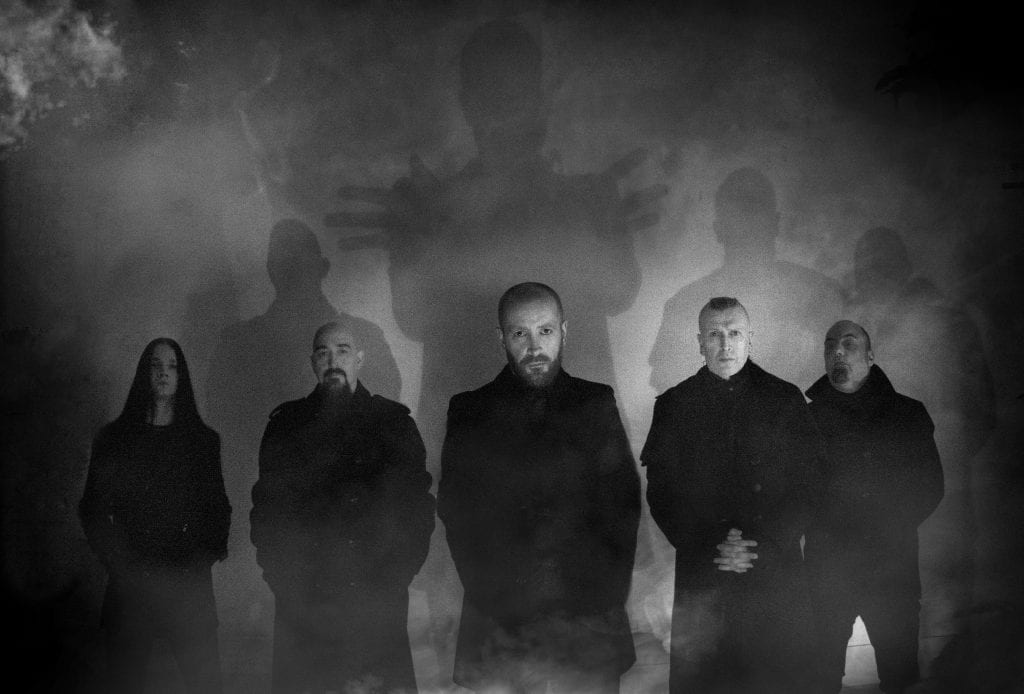
Peaceville Records was established in Dewsbury (nine miles from Bradford) in 1987 by Paul ‘Hammy’ Halmshaw. Northern Music Company management was set up in Bradford the following year. Along with Rio’s nightclub in the city centre, a venue which became a mainstay of metal tours in the UK, the infrastructure for an emergent subgenre was in place.
Paul Groundwell, who started as Hammy’s assistant and is now general manager at Peaceville (as well as guitarist of Thine and The Deathtrip), described the then-new sound to me as the ‘fusion of romanticized doom and death, funerals and fog, which inevitably leads to a gothic aura’.
Greg Mackintosh, guitarist of Paradise Lost, when I asked him what it was about Yorkshire that gave birth to this sound, spoke of ‘the mixture of beauty and poverty’ that characterises the county. Its moors and hard limestone edifices are ‘ingrained, entrenched, in us, as people’ – a physical and mental landscape New Model Army sang of as ‘the valleys of green and grey’.
When he was fifteen, in the mid-eighties, Mackintosh was taken to the Adam And Eve nightclub in Leeds by his older brother. What he found was a room full of goths, punks and metallers who kept their tribes separate: they took turns dancing to their preferred genre of music. The goth scene was exploding on the back of The Sisters of Mercy, but also The Cult from Bradford and Skeletal Family, from Keighley, another town in West Yorkshire. With extreme metal thriving through international tape-trading, a sonic vortex seemed to be created in Paradise Lost itself, which sucked all these musical cultures in and blended them together.
Paradise Lost’s ascent was rapid. From the hoarse roar of Lost Paradise in 1990, they refined and enriched their sound, releasing three albums in the following three years: Gothic, Shades of God and Icon.
The first two albums were released on Peaceville. Groundwell sees the label as initially giving shape to the death-doom sound and movement, ‘at least in the perception and furthering awareness of it being given some form of collective identity.’ But Paradise Lost had already moved on to Music For Nations with Shades of God and in 1995 released their masterpiece on that label, Draconian Times. The raw sound of their origins was behind them, for now.
If I had to nominate an album that got me into metal music, I would have to offer you two: Demanufacture by Fear Factory and Draconian Times. Both released in 1995, the former is a gleaming vision of precision metal, as finely constructed and aggressive as the cybernetic organisms of the Terminator franchise. By contrast, Draconian Times is lush, moody and evocative of another world entirely.
The opening piano chords of ‘Enchantment’ draw you into the album instantly – haunting visions of troubled minds and souls, taunted by the ‘shadowkings’ of madness. It was an instant hit with me as a thirteen-year-old. We listened to it in the family car. I remember teachers sneering at the lyrics in the CD booklet on a school trip to the mountains of Scotland: ‘It’s hardly Milton, is it?’
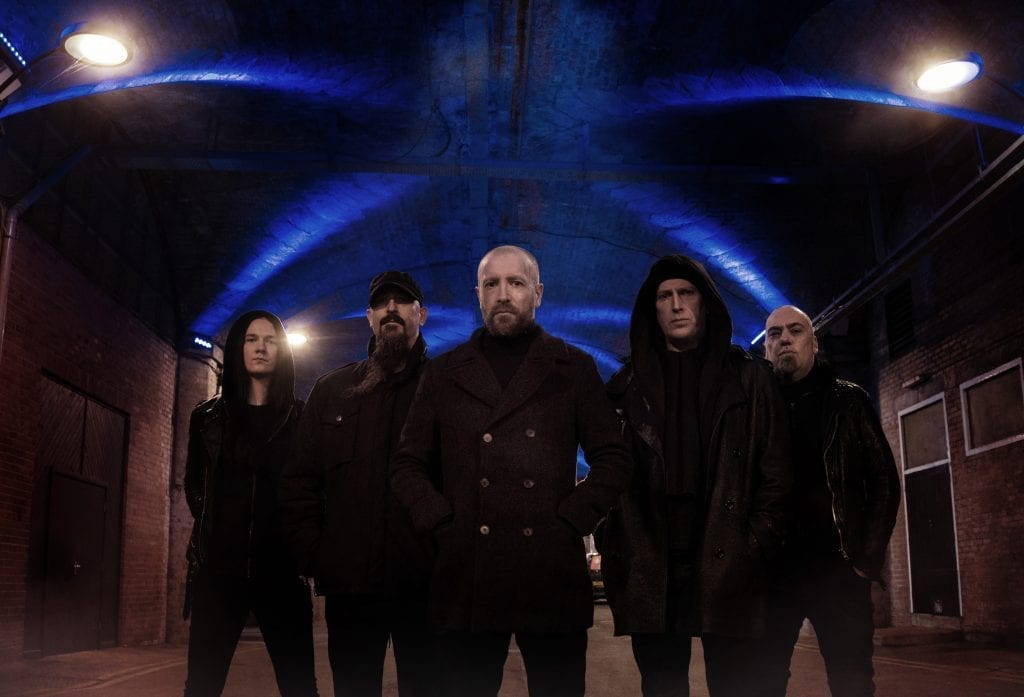
You didn’t need to know who Milton was to enjoy Paradise Lost. You didn’t even need to like metal. The songwriting was that good – it was hooky, layered and pared to the bone. He says it frustrates fans of the album, but for Mackintosh Draconian Times was just ‘a polished version of Icon.’ Writing the album, Paradise Lost were burnt out from touring Icon, an album that broke them out into the metal mainstream. Its lead single, ‘Embers Fire’, was played on MTV and they were invited to support Sepultura on the Chaos A.D. tour. A lot more experienced, and tired enough that they could not afford to overindulge the songs, it resulted in a honed album that 25 years later stands up to another re-release.
In the mid-nineties, its success was not a given. There was a confusing heavy rock landscape which was fast-evolving. Korn had released their debut and a new breed of hybrid American bands were making waves on the European festival scene, such as Machine Head and Biohazard at Dynamo festival in Holland in 1995. Bands would pop up one year and disappear the next. Nonetheless, as Mackintosh puts it, for Paradise Lost it was ‘right time, right place’. They were second on the bill on the mainstage at the final Monsters of Rock festival at Donington Park in August 1996. They played after Fear Factory and before Dog Eat Dog – those two bands were riding the wave of the zeitgeist from which Paradise Lost were strangely separate. Mackintosh remembers being sneered at as ‘hair metal’ in Kerrang! – they still wore their hair long when the fashion was to cut it short.
At Donington, Mackintosh was interviewed by Vanessa Warwick of MTV’s Headbanger’s Ball and said that if Korn got big, ‘I’ll eat my hat’. They did find fellow travelers at the festival in Brooklyn’s Type O Negative, who headlined the second stage that day. For Mackintosh, they were both fishing around in the same musical pond, somewhere between The Sisters of Mercy and Black Sabbath. Attitude-wise, Mackintosh admired Type O Negative’s ‘dourness and almost lack of enthusiasm for photo shoots and videos and playing the game.’
Mackintosh first heard Type O Negative drifting out of Cathedral’s dressing room, when Paradise Lost took them out on a European tour. Cathedral’s singer, Lee Dorrian, was trading tapes with Peter Steele, singer of Type O Negative. Mackintosh loved what he heard and started corresponding with Steele. That wasn’t their only connection. When Paradise Lost played in New York supporting Morbid Angel in July 1993, Mackintosh had a dalliance with a goth fitness instructor from Long Island who it later transpired was the subject of Type O Negative’s single, ‘Black No.1’ – a song that starts, ‘She’s in love with herself’.
Since he was a fan of the band and enjoying success off the back of Icon, Vanessa Warwick asked Mackintosh to interview Steele and Josh Silver of Type O Negative backstage at the tiny Camden Underworld in September 1994. It is an amusing, po-faced interview. The AIDS banter has not aged well, but it has its moments of aphoristic insight from Steele: ‘A lot of people think that Type O Negative loves to hate, when in reality we hate to love. Because all love ends and all love ends in pain. So, why start something that you know at the end is just going to rip your heart out?’ It’s made all the more amusing by the fact that Steele accosted Mackintosh in the World’s End pub upstairs before the show, saying they needed to ‘have a chat’ about the latter’s antics in New York.
In the first book of David Peace’s bleak crime series The Red Riding Quartet, 1974, a little girl is found dead with a swan’s wings stitched into her back. Peace’s books traverse the occult terrain of Yorkshire – historically the county was divided into three ‘Ridings’ (a word of Viking origin). Along the way he sweeps up the very real history of the Yorkshire Ripper, Peter Sutcliffe, who was convicted of murdering thirteen women (and attempting to murder seven others that are known about) in the Bradford and Leeds area between 1975 and 1980. He died in November 2020 after reportedly refusing treatment for COVID-19 after a heart attack two weeks prior.
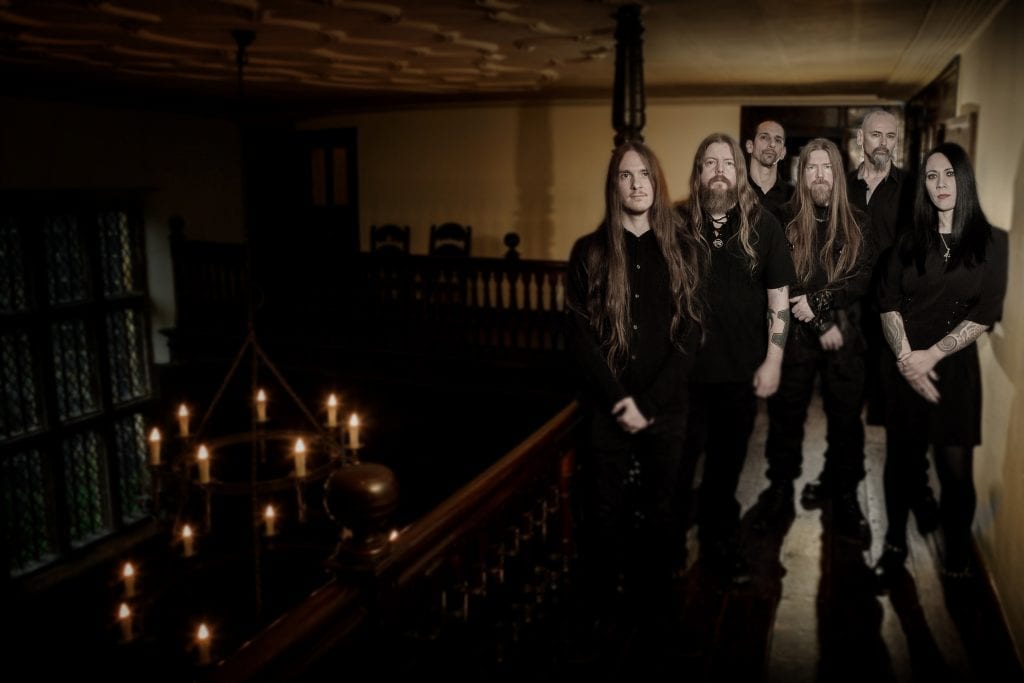
Sutcliffe’s legacy stains the recent past of West Yorkshire. I asked Mackintosh and My Dying Bride singer Aaron Stainthorpe whether his crimes impacted on their music. Mackintosh believes the crimes could have happened anywhere and are not characteristic of the region in and of themselves. Aaron Stainthorpe told me that he reaches further back and tries to avoid what he calls ‘the glorification of serial killers’, saying it is the ‘maudlin tones of old dead poets that gets my juices flowing and not axes and cheese wire.’
My Dying Bride’s second album, Turn Loose the Swans, presented a disconsolate and world-weary set of songs, heavy on sentiment but also overlaid with a harsh, industrial squall of feedback. Released in 1993, the same year as Paradise Lost’s Icon, the title track oozes despair in its blackened guitars and Stainthorpe’s gargling roar, offset with Martin Powell’s plaintive violin.
The band wrote music to the lyrics, not the other way around. In the deluxe 20th anniversary edition of the album, Stainthorpe explains in an audio commentary how the song was a ‘vision of an old poet’ who spent hours and days gazing upon a classical oil painting – an image overflowing with debauchery and opulence. The opium-fuelled poet is so consumed with this all-encompassing simulacrum of life that he falls into it, only to come to the realisation that life is, in Stainthorpe’s words, ‘much more harsh – it’s not fantastical, it’s not lavish, it’s a bit nasty and a bit dark.’ At the end of the song the poet commands, ‘Turn loose the swans’ – the swans representing what Stainthorpe calls ‘the fantastical idea of what poetry and life should be like’. As he faces death, the poet has no need for them.
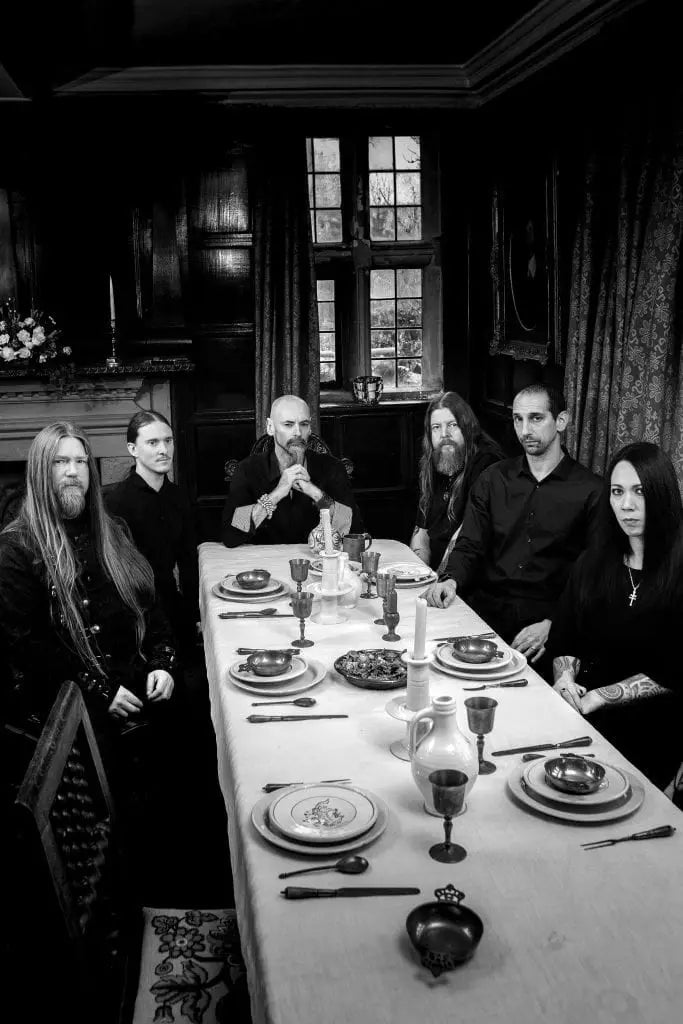
Swans here are the scales falling from the protagonist’s eyes. They are idealism sacrificed to hard reality. Swans return again in the piece ‘Vanité Triomphante’ from EVINTA (MMXX) – a re-envisioning of ‘beautiful and fascinating moments’ from My Dying Bride’s back catalogue with classical musicians – when Stainthorpe’s lyric describes ships that look like dying swans. For him, swans ‘are such a symbol of beauty and peace and tranquillity that I’m surprised I haven’t used them more!’ When they are, they are cast away or dying, just as Peace uses them to compound the feeling of shredded innocence in the Red Riding Quartet.
Another infamous figure from history plays a prominent role in Draconian Times. At the beginning of ‘Forever Failure’, we hear the voice of Charles Manson: ‘Understand procedure. Understand war. Understand rules and regulations. I don’t understand sorry.’ For a dirge-like song about someone who just cannot get life right, Manson’s words conjured just enough empathy to fit the track.
Paradise Lost were taking a break from demoing Draconian Times in Academy Studios, Dewsbury, when they watched the Manson documentary The Man Who Killed The Sixites. Mackintosh thinks that studio engineer Keith Appleton was playing back the demo of ‘Forever Failure’ while they were watching it. At another point Manson says, 'I really don't know what sorry means. I've been sorry all may life. I was sorry I was born. That's what my mother told me.' The documentary seemed to pause. It was a moment of poignancy at odds with ‘the complete lunacy’ that Mackintosh heard coming out of Manson’s mouth onscreen.
Paradise Lost had been looking for a sample for ‘Forever Failure’ and singer Nick Holmes exclaimed, 'What about that? That would be great! What he said – try to get hold of that.’ It was an uncanny moment. They then fell down the rabbit hole of securing the rights to use the clip. To this day, a portion of royalties from the record goes to the Manson Family’s victims.
Though 2020 sees Paradise Lost celebrating the 25th anniversary of Draconian Times, it does not dominate the band’s discography. The last few years have seen the band revisit their original sound with considerable success, starting with The Plague Within in 2015. Their latest, Obsidian, sees them re-incorporating some of the gothic flourishes of Draconian Times again. Watching a solitary Nick Holmes stalk the Yorkshire moors in the black-and-white video for its single, ‘Darker Thoughts’, was a reminder that Yorkshire has a wild, grim and beautiful landscape for a locked-down state of mind.
This begs the question of whether there is some kind of inherent gloom in this part of the British Isles that Paradise Lost and My Dying Bride somehow drew out of the land. Paul Groundwell speculates, ‘That’s a tough one, as perhaps it was just a happy circumstance that this particular (sub)genre became so synonymous with the north of England. I expect some would refer to the misty moorlands and generally dreary weather – plus the dark satanic mills creating some kind of grimness, and sense of sparsity and melancholy. Fusing the gloom of nature and old imposing architecture of industrial buildings, plus then the high amount of churches dotted around still for the quasi-religious undertones, and Whitby not a long way away and the whole gothic association there.’
Dracula landed at Whitby on the east coast in Bram Stoker’s novel and made the town a real-life gothic pilgrimage site. Groundwell gives a lot of credit to Paradise Lost themselves for bringing the focus to Yorkshire. Stainthorpe sees their bands as part of a broader tradition: ‘I think British Gothic suits rather than a more localised phrase because this is land rife with Gothic overtones from the South Coast right up to the north of Scotland, and east to west too. Contemporary authors as well as old romanticists have certainly tainted this fine land with their particular brand of dark musings and bands like us have really taken the baton and ran with it, serving up our own brand of melancholic art and perhaps even educated some people on the highs and lows of Byron and co.’
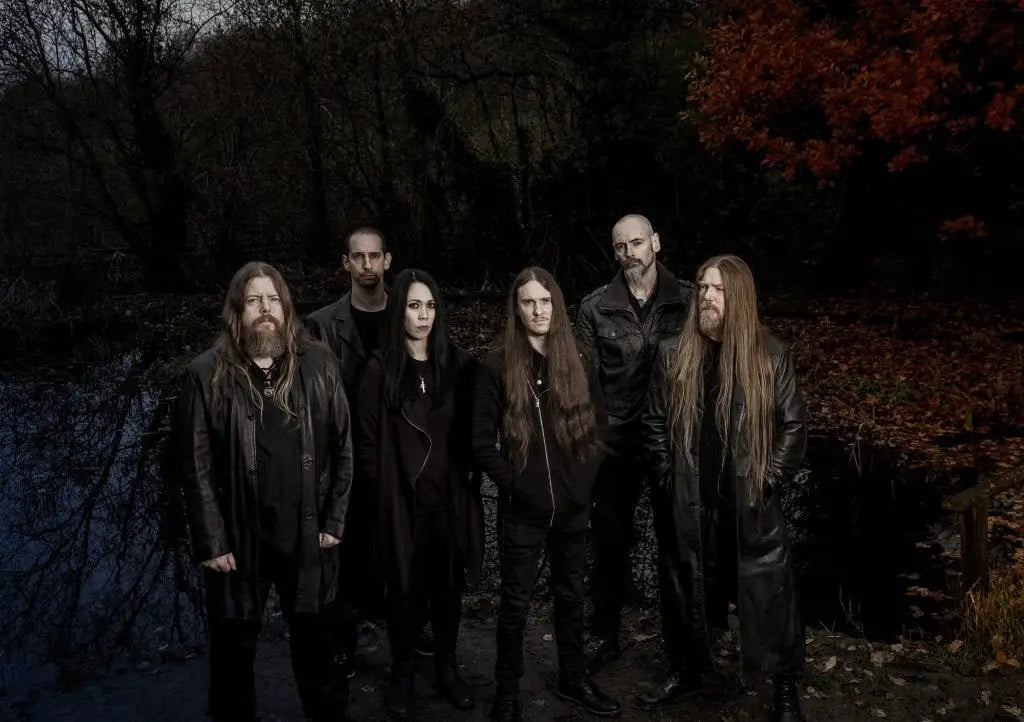
It is grim up north, but it is grim everywhere. Though the Yorkshire way of life can be 'downtrodden' in Mackintosh's eyes, it is also full of life and caustic wit. As he puts it, 'You couldn’t get an edge on you if you tried. It would be beaten out of you at any given moment.’ Even at the height of their fame, they walked into a pub for an interview when a group of punks demanded the ‘rock stars’ get the beers in. Misery loves company – and it is buying the drinks too.
Words by Dan Franklin




